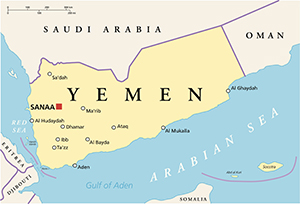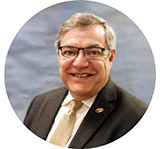I imagine most Americans have heard of Yemen, know it’s in the Middle East, but can’t locate it on a map.

Map of Yemen
Unless you work in international relations, Yemen is one of those “forgotten countries.”
Meanwhile, largely ignored by American news:
- Since 2014, Yemen has been embroiled in a lengthy civil war, a proxy war pitting a Saudi Arabian-led military intervention against an Iran-backed Houthi.
- At least 56,000 civilians and combatants have been killed in armed violence in Yemen since January 2016.
- War, poverty, unemployment, corruption, the COVID pandemic, and more translate to Yemenis living in the poorest country in the MENA region in recent history.
- Lack of safe drinking water, caused by depleted aquifers and the destruction of the country’s water infrastructure, caused the largest, fastest-spreading cholera outbreak in modern history, with the number of suspected cases exceeding 994,751.
- In 2019, the United Nations reported that Yemen is the country with the most people in need of humanitarian aid, about 24 million people, or 85% of its population.
- More than 21 million people—including 11 million children—need humanitarian assistance and protection. The war has left millions of children malnourished. An estimated 2 million people in the country will face high levels of acute food shortages, with an estimated 21,000 children at risk of falling into famine. More than 2.2 million children in Yemen are out of school, and vulnerable boys and girls are at risk of exploitation and abuse. Since the beginning of the conflict, there have been at least 376 airstrikes against educational facilities in Yemen.
- Everything that keeps a country functioning has been destroyed—the economy, infrastructure, education system, medical care, etc., with millions displaced by the conflict and the devastation of the country.
In this perfect storm of national turmoil, Christian Yemenis live under even greater duress.
International Christian Concern states, “Most Christians practice their faith in secret, meeting in small groups in homes or outdoors. Displaying Christian symbols can lead directly to imprisonment, physical abuse, or execution.
“Whereas Yemen has apostasy and blasphemy laws in place, Christians are subject to a wide range of persecution, including the exclusion of family and social life, loss of employment, physical and mental abuse, imprisonment, rape, forced marriages, and death. The degree and source of persecution vary between regions. Tribalism is strong, and often the most severe persecution comes from one’s tribe or clan.
“On the 2022 Open Doors World Watch List, Yemen rose from a ranking of 7th to 5th of the top fifty countries where persecution occurs … Christians have been denied access to emergency humanitarian and medical aid, which typically is distributed by local … leaders… Due to the warring factions, lawlessness, and government dysfunction, Christians and other minorities are increasingly targeted with little hope of protection and justice.”
But amidst hopelessness, there is hope.
According to the advocacy organization Voice of the Martyrs, “a small but steadily growing number of new converts are coming to Christ. Whereas it is extremely dangerous to be identified as a Christian, access to the Bible and other Christian resources online and through Christian media have been key to spreading the gospel and discipleship [emphasis added].”
SAT-7 broadcasts Arabic language Christian programming every day, both the family channel SAT-7 ARABIC and the children’s channel SAT-7 KIDS, throughout Yemen.
In a population of 31.2 million, only a few thousand Yemeni are Christians. But the number of believers in Yemen is growing. Pew Research Center estimates 40,000 Christians are living throughout Yemen.
A new SAT-7 series, We Are the Arabs, uncovers the surprising ancient Christian heritage of this land. It does so with a purpose: to draw valuable lessons for today on how Arab Christians, living as a minority, can dialogue with more dominant religious voices in their countries.
Each of the series 13 episodes is divided between examining the history of Yemeni Christianity from its beginnings to the 10th Century and approaching current difficulties.
We Are the Arabs asks, “How do faith and politics interact?” Another episode looks at the place of Yemen’s neighbor, Ethiopia, in the Bible. The program hosts review the close relations Christians in Yemen and Ethiopia had in the early Christian era.
Each episode examines a Christian concept that has links with historical lessons. It explains topics like the Kingdom of God, salvation, the Trinity, and the divinity of Christ in terms that both Christians and non-Christians can understand.
Consider these Yemeni testimonies of changed lives shared with SAT-7:
- A young woman from Yemen who is divorced and has one child contacted SAT-7. She faced many challenges living with her family members following her divorce. When she returned home, she felt sad to see her sister, who had always been a burden to her. They argued continuously because they are jealous and envious of one another. The SAT-7 counselor advised her to forgive everyone around her so she could sleep peacefully. At first, she declined because she considered forgiving those who had wronged her a sign of weakness and brokenness. The SAT-7 counselor informed her that our ministry is Christian and that forgiveness is our passport to freedom from sin. Every word exchanged caught her attention. Finally, the troubled Yemeni woman went to her sister and begged for forgiveness, but her sister did not believe her. Still, she tried to forgive her sister, but bitterness remained. The counselor urged the Yemeni woman to forgive with all of her heart and pointed her to Christ, who can forgive all human sins, then encouraged her to embrace Christ, who has the power to set her free from the bondage of sin. After much prayer, the Yemeni woman accepted the Lord Jesus Christ as her Savior. All praise to the Lord!
- Walid is from a different religious background, and after contacting SAT-7, he started sharing about his dream to be baptized, then asked, “Is this enough?” A SAT-7 counselor welcomed Walid and asked if he knew about the Christian faith. “I know some things about God and would like to know more,” Walid answered. The SAT-7 counselor told Walid who Jesus is and shared the Good News with him. Then the counselor asked Walid if he would like to receive the Lord as his Savior and God. “Yes!” Walid said, having been touched by God’s love and mercy. The counselor prayed together with Walid, and he received Jesus. Finding that Walid welcomed spiritual follow-up, the SAT-7 counselor sent him a Bible link and encouraged him to begin reading with John’s gospel. “I started reading from John and the epistles to the Hebrews. When I read from John, I felt something in my spirit and [knew] that these are God’s words!” Walid said when SAT-7 checked with him a few days later. “I will continue reading.”
Wherever there are human beings made in the image of God, even in desperate Yemen, there is the Spirit of God, loving, ready to forgive, and granting people hope eternal.
Pray for:
- The forgotten people of Yemen.
- Conflict to cease and peace to be established.
- The hearts of Yemeni people to be open to the Gospel.
- SAT-7’s ministry broadcasting and streaming online Arabic language Christian programming directly to Yemenis in their homes.

Dr. Rex Rogers
President, SAT-7 USA
Banner photograph by Peter Biro/Flickr.